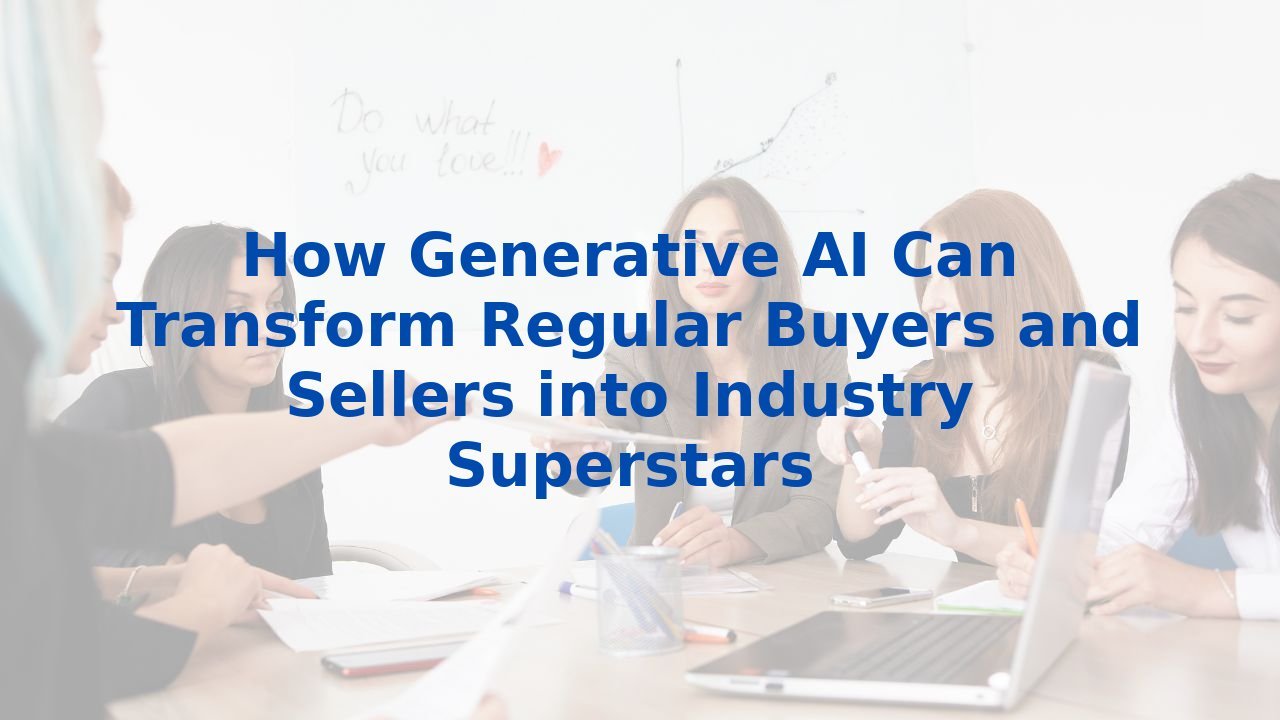How Generative AI Can Transform Regular Buyers and Sellers into Industry Superstars
How Generative AI Can Enhance Business Processes and Efficiency
Introduction
In the rapidly evolving landscape of business, the integration of generative AI is not just an enhancement—it's a revolution. Emerging as a formidable ally for companies, this technology can transform regular buyers and sellers into industry superstars. Let's explore how generative AI can refine crucial business processes and elevate organizational efficiency.
The Role of Generative AI in Business Processes
Generative AI encompasses tools that utilize sophisticated algorithms to generate human-like content, impacting various aspects of business operations. Here’s how:
Content Generation
Imagine the power of generating captivating marketing materials or concise product descriptions in a fraction of the time it usually takes. Generative AI can produce relevant and engaging content swiftly. However, vigilance is vital to ensure that the integrity and context of the messaging remain intact. This ability not only speeds up creativity but also empowers teams to focus on strategy and engagement rather than getting bogged down in tedious creation tasks.
Automated Reporting
Data analysis can often feel like finding a needle in a haystack. Generative AI simplifies this by parsing through large datasets, extracting trends, and providing insights that might elude human analysts. This feature is particularly beneficial in data-heavy fields like finance and marketing, where actionable insights are invaluable for guiding business decisions.
Customer Interaction
Today's consumers expect personalized experiences. With generative AI, businesses can craft tailored communications based on customer data. By generating responses that resonate with individual preferences and past behavior, companies can significantly enhance customer satisfaction and build lasting loyalty. This shift towards personalization makes every interaction count.
Process Automation
Repetitive tasks can drain resources and dull creative potential. Generative AI steps in to automate these functions, allowing teams to redirect their efforts towards strategic and innovative pursuits. For example, in wealth management, AI can handle mundane data entry, freeing financial advisors to focus on building meaningful client relationships.
Benefits of AI for Improving Efficiency
The integration of generative AI into business processes is not merely an upgrade; it’s a significant leap forward in efficiency. Here’s why:
Speed and Accuracy
AI tools possess the remarkable ability to process vast amounts of information swiftly and accurately. By minimizing human error and expediting processes, organizations can operate at a pace and precision that keeps them competitive in today’s fast-moving market.
Scalability
As your business scales, the demands on human resources can become overwhelming. AI shines here, seamlessly managing high volumes of data and repetitive tasks—without fatigue. This scalability ensures that operations continue smoothly, regardless of business growth.
Enhanced Decision-Making
With access to real-time data insights generated by AI, decision-making processes are transformed. In sectors where precise planning is crucial, these insights become the bedrock upon which informed strategies are constructed. This alignment of data and decision-making empowers organizations to act decisively and strategically.
The Importance of Training Employees for AI
While the benefits of AI are vast, the potential is only fully realized when employees are equipped to leverage this technology. Training is not just an afterthought—it's integral to success.
Understanding AI Capabilities
Employees need to grasp the strengths and limitations of AI tools. This knowledge is crucial not merely for operating the technology but for crafting insightful prompts that lead to valuable outputs. Knowing the capabilities of AI transforms the workflow, allowing teams to harness its full potential.
Critical Thinking
As AI produces content, employees must apply a critical lens to ensure relevance and accuracy. This ability not only safeguards the quality of output but also fosters an environment of continual learning and adaptation within the organization.
Adaptability
With AI technology evolving at an unprecedented pace, the ability to adapt is paramount. Ongoing training equips employees with new skills and perspectives, keeping them relevant and prepared for the future. This agile mindset fosters an innovative workplace culture that thrives on change.
Conclusion
The transformative power of generative AI is intricately linked to its ability to enhance business processes and elevate efficiency. By implementing AI for tasks ranging from content creation to customer interactions, organizations position themselves to innovate and lead. However, the human element of training is essential—it empowers employees to engage with AI effectively, ensuring that the full spectrum of benefits is realized. In this dynamic environment, even the most regular buyers and sellers can rise to become industry superstars, equipped with the tools to navigate and shape their futures.



